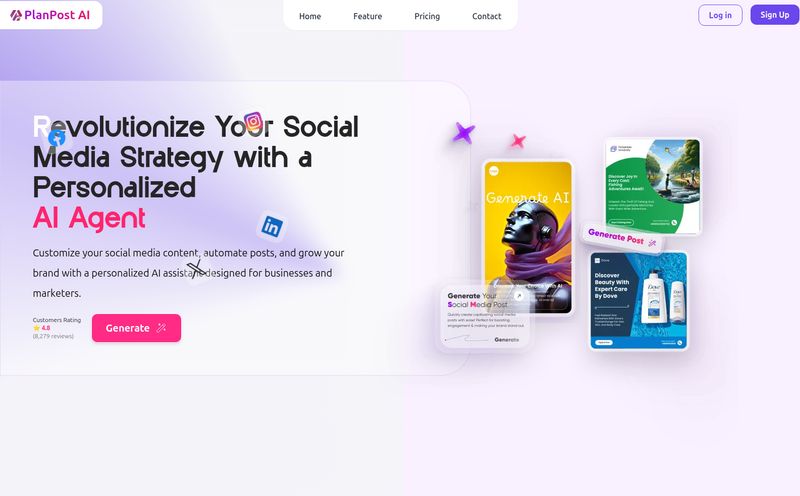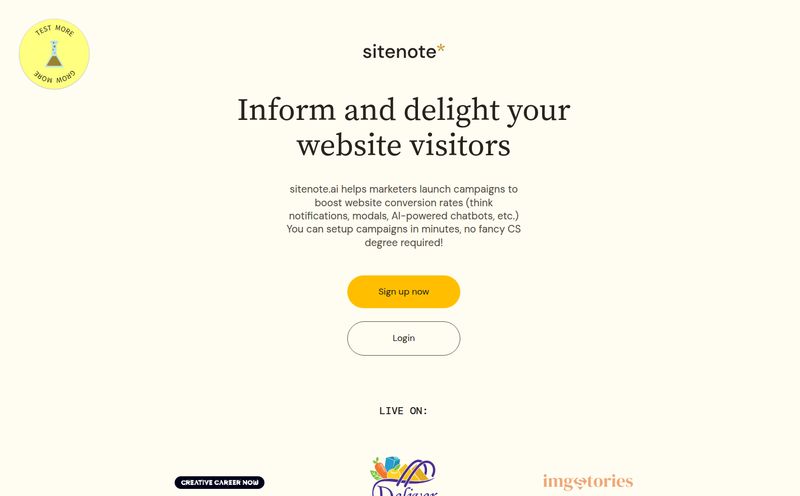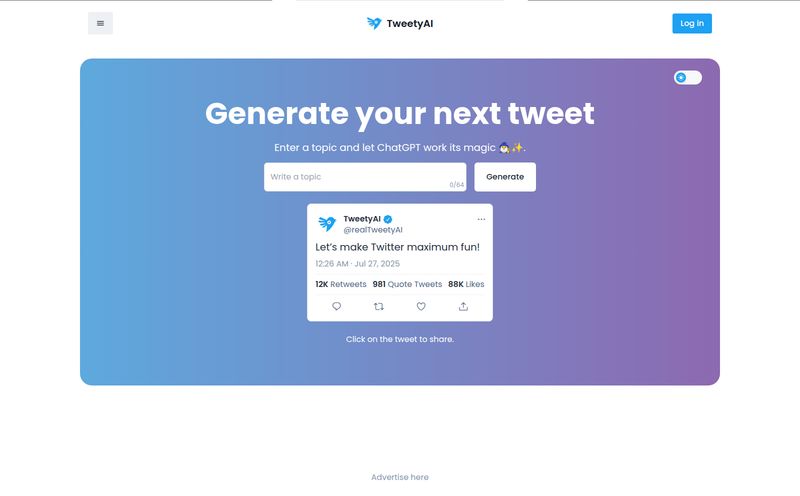We’ve all been there. Staring at that blinking cursor in the ChatGPT window, trying to summon the perfect words to get the AI to do what we actually want. It feels a bit like trying to explain a complex recipe to someone who only speaks in riddles. You know what you want the final dish to taste like, but getting the instructions just right? That’s another story entirely.
For years, I’ve been neck-deep in the world of SEO, content, and traffic. I’ve seen trends come and go. But the rise of generative AI has been... different. It’s not just a trend; it's a fundamental shift. And the new bottleneck isn't writing speed, it's prompting speed. The quality of your input directly dictates the quality of your output.
So when I stumbled upon a platform called God of Prompt, my curiosity was piqued. The name alone is bold, promising a divine intervention for our AI-wrangling woes. But I’m naturally skeptical. I’ve seen dozens of tools promise to revolutionize my workflow, only to end up being another subscription collecting digital dust. Is this one different? I decided to find out.
So What Exactly Is God of Prompt?
In short, God of Prompt isn’t another AI model. Thank goodness. It’s more like a master cookbook for the AIs you already use. It’s a massive, curated library of pre-built, high-quality “mega-prompts” designed for tools like ChatGPT, Claude, Gemini, and Midjourney. The whole idea is to give you a shortcut past the trial-and-error phase and straight to the good stuff—the high-quality, personalized outputs you were hoping for in the first place.
Think of it this way: a basic prompt is like telling a master chef, “Make me some Italian food.” You might get spaghetti, you might get a weird risotto. A mega-prompt from this platform is like handing that same chef a detailed, step-by-step recipe for Cacio e Pepe exactly the way your nonna used to make it, complete with notes on cheese selection and pepper coarseness. You get a far more predictable, and usually better, result.
The Agony and Ecstasy of Prompting
The secret sauce of any good AI interaction is prompt engineering. It's a term that sounds a bit stuffy, but it’s the new essential skill. It’s the art and science of talking to a machine. And honestly, it can be exhausting. You can spend an hour tweaking a prompt, changing a single word here, adding a constraint there, just to get a paragraph that doesn’t sound like it was written by a robot from the 1950s.
This is the problem God of Prompt aims to solve. It’s for the marketer who needs 20 social media posts yesterday, the blogger who needs a clever outline for an article, or the designer who needs a consistent character for a Midjourney project. It’s about saving brainpower and time, which, as we all know, is money.
A Look at the God of Prompt Features
So what’s actually in the box? The platform is built around a few core components that cater to different needs, from writing to full-on web design mockups.
The Mega-Prompts are the Main Course
This is the heart of the platform. These aren't your one-line “write me a blog post about dogs” prompts. They are structured, detailed, and often include variables you can plug in to customize the output. They have packs specifically for different tasks—a Writing Pack, a ChatGPT Bundle, etc. It’s all about giving the AI enough context and guardrails to produce something genuinely useful.
Beyond Text with Midjourney Prompts
This was what really caught my eye. As someone who’s spent way too many hours (and fast hours) trying to get Midjourney to generate a decent-looking logo or a specific style of illustration, this is a godsend. Their Web Design and Midjourney bundles contain thousands of prompts to create mock-ups, banners, and images with a consistent aesthetic. This is a massive time-saver for anyone in the visual space.

Visit 200+ ChatGPT Mega-Prompts for Marketing
A Prompt Library You Can Actually Use
All these prompts are organized in a prompt library, accessible through their site or, interestingly, in Notion. I’m a big Notion user, so this was a nice little touch. It makes it easy to copy, paste, and adapt prompts right into your existing workflow without having another 10 tabs open. They also have a prompt generator for crafting your own, which is a neat addition.
Let's Talk Money: The Pricing Breakdown
Okay, the part everyone's waiting for. How much does it cost? This is where God of Prompt pleasantly surprised me. In a world dominated by the SaaS subscription model ($20/month here, $50/month there), they’ve gone with a one-time payment model. You buy a pack, you own it. And you get lifetime updates. Hallelujah.
Here’s a quick look at their main offerings:
| Plan/Pack | What You Get | Price (One-Time) |
|---|---|---|
| Free Tier | 1000+ ChatGPT Prompts, 100+ Midjourney Prompts, Guides | $0 |
| Writing Pack | 200+ mega-prompts specifically for writing | $37 |
| Web Design Pack | 1500+ Midjourney prompts for web design mockups | $27 |
| ChatGPT Bundle | 2,000+ mega-prompts for ChatGPT, Claude & Gemini | $97 |
| Midjourney Bundle | 10,000+ prompts for logos, banners, mockups | $67 |
| The Complete AI Bundle | Everything. 30,000+ prompts for all platforms. | $150 |
Note: Prices are based on the information available at the time of writing and might change. Always check their official pricing page for the latest details.
The free tier is genuinely generous and a great way to see if their style of prompts works for you before you commit any cash. For my money, the one-time cost for lifetime updates is a massive plus.
The Good, The Bad, and The Honest Truth
No tool is perfect. After playing around with both the free and some of the paid prompts, here’s my honest take.
What I Genuinely Liked
The time-saving aspect is real. For drafting social media calendars, brainstorming content angles, or creating a batch of Midjourney images, it easily cut my time by more than half. The quality of the output is also noticeably better than what you get from simple prompts. And I'll say it again: the one-time payment with a 7-day risk-free guarantee feels very pro-consumer.
Where It Could Improve
If you're already a seasoned prompt engineer—someone who builds complex, multi-step prompt chains for a living—you might find some of the prompts a bit foundational. They are designed for efficiency and broad use, not necessarily for hyper-niche, expert-level tasks. So while they're amazing for 90% of users, the top 10% might still prefer to build from scratch. It's a toolkit, not a magic wand.
Who Is God of Prompt Really For?
So, who should click that 'Get Access' button? In my opinion, it’s a near-perfect fit for a few groups:
- Content Creators & Bloggers: To speed up research, outlining, and drafting.
- Marketers: For generating ad copy, social media content, and email campaigns at scale.
- Freelancers & Solopreneurs: When you’re the entire marketing and design department, time is your most valuable asset. This is a force multiplier.
- Web & Graphic Designers: The Midjourney packs are a fantastic way to quickly generate mockups and visual assets for clients.
It's for the practitioner who understands AI is a powerful tool but doesn't have the time or desire to get a Ph.D. in prompt engineering.
Conclusion: So, Is It Worth a Shot?
After my initial skepticism, I have to say I’m impressed. God of Prompt isn't just selling prompts; it’s selling time and consistency. It bridges the gap between the potential of AI and the practical reality of getting good results without tearing your hair out.
It won't make you a creative genius overnight, but it will absolutely make you a more efficient one. It's a solid, well-priced toolkit that delivers on its core promise. With a substantial free offering and a 7-day money-back guarantee on paid products, there’s very little risk in giving it a try. For anyone looking to get more out of their AI tools, this could very well be the cheat code you've been looking for.
Frequently Asked Questions
- 1. Is God of Prompt a monthly subscription?
- Nope! One of its biggest selling points is the one-time payment model. You buy a product pack and get lifetime access and updates, which is a breath of fresh air.
- 2. What AI platforms do these prompts work with?
- The prompts are designed primarily for major large language models like ChatGPT (all versions), Google's Gemini, and Claude. The image prompts are specifically for Midjourney.
- 3. Are the prompts really better than what I can write myself?
- For most people, yes. They are structured to give the AI more context, constraints, and instructions than a typical one-sentence prompt. This leads to more detailed, accurate, and higher-quality results with less back-and-forth.
- 4. What’s the main difference between the free and paid versions?
- The free version gives you a large collection of standard prompts and a few “mega-prompts” to try out. The paid packs offer thousands of specialized, more complex mega-prompts tailored to specific tasks like marketing, writing, or web design.
- 5. Is the 7-day risk-free guarantee for real?
- Yes, according to their website, if you are not satisfied with a purchased product for any reason within 7 days, you can request a full refund, no questions asked.
- 6. Do I really get lifetime updates on purchased packs?
- That's the promise. As they add new prompts and guides to the packs you've purchased, you should get access to them automatically without any additional cost.
Reference and Sources
God of Prompt Official Website: godofprompt.ai
Official Pricing Page: godofprompt.ai/pricing
A Primer on Prompt Engineering from DeepLearning.AI: ChatGPT Prompt Engineering for Developers



